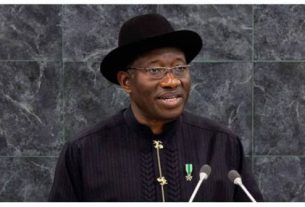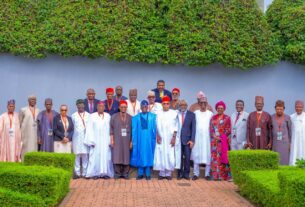The exploration of the dynamics between former Kogi State helmsman, Yahaya Bello and Nigeria’s anti-corruption agency, Economic and Financial Crimes Commission (EFCC) as it played this week is no longer news. Following the yo-yo like locomotion between the body mandated with investigation of economic infractions amongst others that resulted in a Gestapo like scenario where gunshots enveloped the skies at Kogi State Liaison Office, Asokoro where an attempt was made to apprehend erstwhile Governor Bello in the wee hours of the night by agents of EFCC has finally become comedic.
The concern here likely centres around the potential shift from legitimate legal prosecution to targeted harassment or persecution by the EFCC, a scenario that has been a subject of public discourse when it comes to political figures.
There are key themes to explore in this latest development with EFCC’s role as the foremost anti-graft agency in Nigeria, tasked with investigating financial crimes such as money laundering, embezzlement, and corruption. High-profile figures, especially those in government, are often subject to scrutiny by the EFCC.
This intervention is not to x-ray the legal challenges confronting Bello outing as a public servant saddled with the responsibility of state domain or to discuss the speculation in the court of public opinion as the EFCC beam its light into the financial dealings involving the former confluence state helmsman administration, particularly around the allocation and use of state resources.
The meat of my submission however revolves around the subject of prosecution vs. persecution.
To gain oversight on the matter at hand. The EFCC’s role to investigate financial crimes and prosecute individuals whom have fallen short of their oath of office vis-a-vis their public perception on how that mandate is applied and/executed must be thoroughly examined. In this context, prosecution refers to legitimate legal actions taken by the EFCC, if financial impropriety is discovered.
The shift to “persecution” would therefore imply that the EFCC has shifted away from the modus allowed by law into the arena “anyhowness” and sometimes these actions could be politically motivated, or possibly used as a tool to harass or weaken perceived opponents political base. This kind of narrative has been a talking point in Nigerian politics, especially when anti-corruption efforts target prominent figures.
The concerns about abuse of power have come to the fore with memo’s flying left, right and centre between spokesperson’s of the EFCC and Yahaya Bello. The concerns underlying the title might be that while the EFCC is expected to operate independently, its actions could be influenced by political dynamics.
For the benefit of our readers, let me try and recapture the trail of events leading to the recent bullets of memos and press releases flying left, right and center between both parties.
EFCC declared Yahaya Bello wanted, Yahaya Bello approached the Court in an attempt to enforce his fundamental rights, and after a protracted legal battle, where the legal representation to Yahaya Bello was threatened with contempt proceedings for failing to produce Yahaya Bello, the Court ruled that Yahaya Bello must report to EFCC or appear before her for arraignment.
On Wednesday, Yahaya Bello smartly reported to EFCC in compliance with the request of EFCC that had hitherto declared him wanted.
After allegedly waiting for three hours and meeting with Michael Nzekwu, the Chief of Staff to the EFCC chairman, the same EFCC asked a Yahaya Bello declared wanted by them to go home.
Few hours later, the same EFCC turned around to issue a press statement stating that Yahaya Bello is not in their custody as he is still a wanted person. Absurdity you will say.
Yahaya Bello subsequently issued a release with pictorial evidence stating that he was requested to go home by the same EFCC.
The absurdity entered a new level when EFCC with full complement of armed police guards, attempted to break in the Kogi State Government Liaison Office later that night to effect the arrest of Yahaya Bello, shooting sporadically in the process.
There have been accusations in the past that the EFCC has been used to settle political scores, especially as elections draw near or when certain political figures become a threat to others’ ambitions.
The implications for governance and the rule of law cannot be underscored. Yahaya Bello’s camp might argue that the EFCC must be careful to uphold the rule of law, ensuring that any action taken against the former governor is based on concrete evidence and due process while the ecosystem of public perception is laden with antagonism and protagonism as it suits all the parties therein.
The If the EFCC’s investigation of Bello is perceived as a witch-hunt or politically motivated persecution, it could undermine the credibility of the anti-corruption body.
On the other hand, Yahaya Bello is in the eye of the storm and he has another day in court on Wednesday, 25th September 2024. He must be able to navigate the mucky roads of his current travails with tact and finesse, not just as a politician but also as a chartered Accountant that he is. He must be sure to his political opening credits and closing credits.
His legal counsel(s) must be able to present his case before the esteemed bench as professionally as possible and If the EFCC’s actions are seen as an attempt to tarnish his image because of his political capital, his media handlers must also be on top of their game to ensure the public is aware of the actual narrative, failure which he might just be kissing goodbye to his public persona.
In a nutshell, the federal government should not allow the alleged checkered relationship between some of President Tinubu’s kitchen cabinet members and Bello to suggests the hand of Esau and the voice of Jacob in his travails as that might be a defense for Yahaya Bello against what is already being perceived as overreach by the EFCC as they must accord him all his constitutionally allowed rights.
The time calls for caution to ensure that the line between prosecution and persecution is not blurred.
Lastly as we advocate for due process and warn against the use of legal bodies like the EFCC for political purposes, we must also emphasize the importance of accountability in governance.
Ayoola Ajanaku is a Communications and Advocacy Specialist based in Lagos, Nigeria…








